 This is not a defence of relativism.
This is not a defence of relativism.
It is a challenge to the concept of “objectivity,” and in particular to the way in which claims of objectivity are weaponized in discussions about truth.
We’ve all been in this conversations: someone makes an assertion that is contradicted by your experience. So you share your story and you’re instantly accused of arguing from emotion or of projecting your own experience onto reality. Your interlocutor, of course, is not swayed by such considerations. They are “objective.” Completely disinterested. Only concerned about the truth.
The pretext of objectivity disallows questions of motive, thus effectively obscuring the role that self-interest plays in the formation of ideologies. This is always to the advantage of those who benefit from the status quo. Those who hold power are able to disguise their desire for power, sometimes deceiving even themselves. They are able to appeal to “objective” ideological considerations and then to claim that the existing situation conforms to natural criteria of the good and that it is for this reason (and not because of the benefits which they obtain from the current system) that the present order is to be preserved.
Those who demand change, on the other hand, are perceived to be excessively concerned with power. Such considerations are, of course, beneath those who just happen to hold power already. Those who suffer under the present system are accused of making emotional appeals, rather than rational arguments. Their suffering is delegitimized, again in the name of “objectivity.”
The problem is, the terms of objectivity are defined and enforced by the exercise of cultural power. We’ll discuss why that is always true in a minute, but first I want to talk about what power is and why it’s not dirty word.
By “power” I don’t mean a fundamentally evil force whose only function is oppression and domination. Rather, I refer to that productive force which allows both creation and destruction, both empowerment and exploitation.
Power is not a bad thing. It cannot be eliminated, nor would its elimination be desirable. Survival is a function of power: without the power to organize and create consensus around questions like “where should we go hunting?” or “who should stand watch tonight?” humans would be defenceless, squishy, and probably extinct. But even beyond the need to kill mammoths and avoid being eaten by tigers, the entire creative apparatus of culture relies on the use and abuse of power.
That “and” however, is critical. Even in our best attempts to be loving and responsible stewards of the power that we are given, we all routinely fail to truly lover our neighbour as ourselves.
In part, this is a function of epistemology – the way that we know things. Fallen humans are not capable of perfect love for the other because we are not capable of knowing or being known fully by one another. Our subjectivity colours all of our thoughts and our actions, causing us to be ineluctably biased in favour of our own perceptions and experiences. We project our interiority onto others, and even onto the world at large. No one who has even the slightest self-knowledge can be ignorant of this tendency in her or himself.
But, mostly because of hubris, we like to imagine that this effect is trivial or to pretend that it is possible to reason correctly simply by adhering to external, “objective” principles. We flatter ourselves that our intellects are capable of flying up, beyond mundane considerations, to stare upon the perfect face of truth. Every intellectual is Icarus, either in flight, or in descent.
And objectivity is the wax of which our wings are formed.
Now, there is a relative sense in which objectivity is a useful concept. We routinely call on mediators to resolve disputes, precisely because the mediator is more objective: that is, relative to the other people involved they have less at stake. They will be less swayed by immediate subjective considerations.
But if objectivity is a meaningful idea outside of a relative context, it must have its source in the absolute. God is capable of objectively considering all human situations because God is not limited by a single, bounded experience of reality.
However, God’s objectivity has a peculiar characteristic that is fundamentally different from the objectivities that are usually proposed by human beings. Divine objectivity does not obliterate subjectivity, but rather contains all subjectivities. In God “we live and move and have our being.” We are perfectly known and loved completely: God has a total stake in every human life. Divine judgments are objective because they are impartial, not because they are disinterested.
True objectivity therefore consists in the reconciliation, comprehension and correct evaluation of all human experience, not in the elimination of subjective knowledge.
The obstacle that this presents to human objectivity is so daunting it cannot be overstated. A human being cannot even truly or fully know even her dearest friend, or the beloved that he has spent his entire life with. It is the height of absurd folly to think that we could even begin to approach “objective” knowledge.
What we term “objectivity” then is simply a consensus arrived at on the basis of shared subjective knowledge. Now, this is actually a great way to try to arrive at something (extremely) roughly approximating objectivity, and so long as we have the humility to realize its limitations it’s really the best way to proceed.
However, we need to be aware that the playing field is not level. Some subjectivities are prioritized over others: they are given more weight and have a greater capacity to define the parameters of the discussion. This means that certain subjective experiences, or principles derived from considering those experiences, come to be labeled as “objective.” This puts all contrary subjective experiences at an automatic disadvantage in terms of their right to be represented or considered as true.
Wealth, worldly authority, education, influence, sex, race, and other factors provide certain voices with a greater chance of being heard and respected – these traits confer cultural power. Those whose subjective experiences align most closely with those of the people who have had the most influence on the development of any given culture’s consensus are more likely to feel that the consensus reflects objective truth. They are the most likely to be caught up in the illusion of objectivity because the claims that are being made are largely conformable with their own subjective knowledge of the world.
On the other hand, those whose experience has been traditionally excluded, or only included in so far as it is commensurable with the experience of the cultural majority, face an additional obstacle to being taken seriously when they do contribute. Their experiences are merely “subjective,” and must be judged in accordance with the “objective” criteria that have been established by those who have had more opportunity to shape popular conceptions of truth.
Privileged perspectives are seen to have been proven, to represent established fact, and when these facts are challenged the person or group that challenges them faces a considerable obstacle. Because their claims violate widespread cultural beliefs, they are treated with a degree of suspicion that is not accorded to claims that are concordant with those beliefs. Even if their perspective is typical of people who have similar experiences, because those experiences have not traditionally been accounted for when determining what is true they are seen as anomalous, marginal, perhaps even illegitimate or perverse.
What this means is that people who have been historically well-represented within cultural discourse are enabled to enshrine their own experience as “objective” while dismissing contrary experiences as merely subjective. Such people are often blissfully, and in some cases willfully, unaware that the word “objective” is being used to designate a system of subjectively derived impressions that happen to have been developed by a group of people with life experiences similar to their own.
Acknowledging this is not a fallacy. It is a necessary precondition if we genuinely want to seek truth more than we want to preserve power. Indeed, denying the role that bias and self-interest plays in the formulation of truth does not serve to protect truth anymore than denying the existence of micro-organisms protects against disease. Knowing and acknowledging that the will to power distorts the pursuit of truth is a precondition for attempting to correct the distortions.
Yes, there is a risk of reducing truth to a power struggle, of becoming so hyper-aware of the ways in which self-interest shapes perception that we come to think that truth is nothing more than a means of social control. This is often coupled with a purely negative understanding of power as a means of oppression, without recognizing that power is primarily a constructive force.
But the opposite error – denying that the power to define truth is routinely used destructively, to oppress rather than edify – is not better.
The first error comes from taking the perspective of the marginalized and the oppressed as paradigmatic, and therefore sees truth as fundamentally exclusive and oppressive. The second error comes from taking the perspective of the dominant and privileged as paradigmatic, and therefore sees truth as a possession or an accomplishment which can be wielded against the weak.
Truth itself lies in the reconciliation of these disparate experiences. In seeking it, we must be constantly aware of the risk of accepting as true things which are merely convenient for ourselves, or for those with whom we sympathize. We must equally be confident that it is possible to seek truth in good will, and that such a pursuit, undertaken to the best of our limited abilities, is worthwhile. That even though truth will always, in this life, exceed our grasp none the less there is value in trying to get beyond ourselves, to that knowledge which is love.
Image courtesy of Pixabay.
Stay in touch! Like Catholic Authenticity on Facebook:











